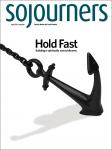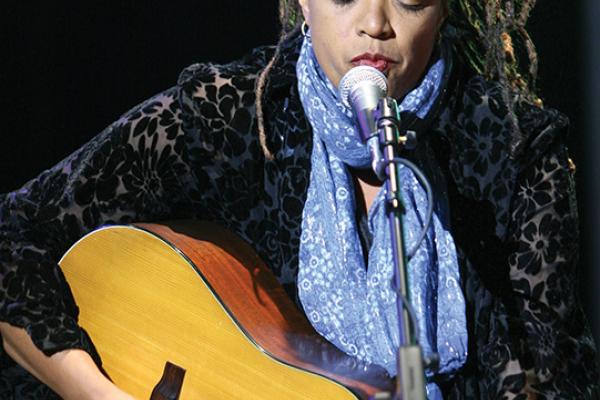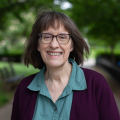JUDITH CASSELBERRY'S ORIGINAL LOVE WAS MUSIC. She has been a guitarist and vocalist her entire adult life, including a 1980 to 1994 stint as part of the duo Casselberry-DuPreé. She now performs with Toshi Reagon and BIGLovely. She has shared the stage with Sweet Honey in the Rock, Odetta, Stevie Wonder, Etta James, and Elvis Costello, among others.
Along the way, while still performing, Casselberry earned her bachelor’s degree (in music production and engineering) and then, a few years later, a master’s in ethnomusicology, during which she discovered a passion for teaching. So she went to Yale, earning a doctorate in African-American studies and anthropology in 2008. She is an associate professor of Africana studies at Bowdoin College in Brunswick, Maine, teaching courses on African-American women’s religious lives, music and spirituality in popular culture, music and social movements, and issues in black intellectual thought.
Casselberry’s forthcoming book, The Labor of Faith: Gender and Power in Black Apostolic Pentecostalism (Duke University Press), employs feminist labor theories to examine the spiritual, material, social, and organizational work of women in a New York-based Pentecostal denomination, Church of Our Lord Jesus Christ of the Apostolic Faith (COOLJC). In the course of her research, Casselberry immersed herself for more than two years in the life of True Deliverance Church in Queens, N.Y. She spoke by phone with Sojourners senior associate editor Julie Polter in late January.
Sojourners: You examine the “religious work” of women—including prayer, teaching, care for the sick and grieving, liturgical music and movement, and guiding converts. Why did you choose this framework?
Judith Casselberry: I felt that the academic literature was missing a thorough investigation into the vast amount that women do, in any number of denominations or religious systems, that is specifically about developing a relationship with the divine—meaning what that actual work is, irrespective of how it may or may not translate into other political or civic activity.
I looked at how the religious work translates into spiritual power, and how that power functions within the religious community, especially in the institution I was researching, a patriarchal, male-headed denomination.
There is often an assumption about women in religions that liberal (writ large) thinkers view as fundamentalist—that “if they knew better, they could do better.” That is really disturbing to me. As a self-identified black feminist, I wanted to not take my political perspectives into the research. Given the number of women around the globe involved in religions that some might view as oppressive or fundamentalist, we need to understand more about their lives and what they do, why they do it, and what they gain, outside of trying to filter it through a political liberal-progressivist agenda.
We need to be able to bring more women into our conversations about women, without a particular judgment about their politics. It’s critical that we figure out how to reach across these lines and come to some fundamental agreements as women about what we need and the plight of women globally.
In some conservative churches, women are forbidden to teach men. But in COOLJC, at some points men who wanted to go into the ministry were encouraged to get their initial training at regular teaching sessions facilitated by women. How did you discover this?
I found in the written histories of the church that there were women missionaries [a denomination-licensed lay position for women demonstrating spiritual gifts]. But when I started speaking with some of the older mothers of the church, how this actually operated and what their role was in educating everyone in the church was really spelled out. Sometimes we’ll take a role that is gendered and assume that it is less influential—like the assumption that a teacher is less influential than a preacher. This work helped me to understand that isn’t necessarily the case.
You write that women in this church (whose professions include judge, bank vice president, and school principal) move between supporting a religiously based patriarchal system and resisting the race-based patriarchal system of a secular work place. How?
The spiritual mandate to be submissive to authority pertains to their husband and men of authority in the church, the pastor, the bishop. But once women are outside the church, they don’t have a spiritual mandate to be submissive to male authority figures in the workplace. On top of that, they’re cognizant and have lived racism in America, so the idea of racial equality is at the heart of how they understand the church and themselves.
For some of us this may feel like a tension, but more often the way they talked about it was, “this is what happens in the church; this is the scriptural foundation for the church.” The point being, in order to fully develop your holy personhood, you are constantly working within the framework of how you understand scriptures, the word of God, and how you’re going to bring yourself daily into alignment with what you know that to be. Because they are spirit-filled people, they carry themselves with a great deal of moral and spiritual authority.
You immersed yourself in True Deliverance Church for a couple of years—Bible study, learning to pray for hours. How did this project affect your spiritual life?
I have a new understanding of the power of prayer and the way that works. Going into it I was definitely a spiritual person, but learning to deliberately stay in a state of communication with the divine, with God, definitely had a deep impact on me.
You cite curiosity about how a Pentecostal upbringing influenced performers such as Sister Rosetta Tharpe, Marvin Gaye, and Sam Cooke as one factor that led to your area of study. What have you learned?
Once we’re talking about the sense of Spirit-infilling as the core of religious experience, there’s both intent and abandonment. You have to be willing to give yourself over, to give up ego, will, and self, and at the same time you have to be very intentional about it. This isn’t unique to performers who come out of Pentecostal backgrounds. But I think that was one thing at the core of the people I was listening to and why I was drawn to them.
How has your vocation as a musician affected your academic vocation?
I never let go of the performing, and it’s completely informed my perspectives and my academic work. The dual streams—or, as I think about it, the lettered and performed scholarship—have worked together quite nicely.
In music and performance, I’m confident communicating with people in a way that is not the way that we communicate in the academy: Not such a heavy focus on writing, much more communicating verbally and nonverbally, body language, throwing cues, feeling the energy of what’s happening in a musical context, feeling the energy and responses of audiences, understanding the real intimacy of working with other musicians—how you open yourself up to spaces that are deeply personal and things that maybe you can’t even really articulate with words.
That informed how I was able to move through this world [of True Deliverance Church]. It really served me well in terms of being able to grapple with different registers of information and energy and not feel like “Oh, that isn’t legitimate because how am I going to write that?”. Instead I’d challenge myself, well, how am I going to write that? How am I going to explain this? All the years doing music, communicating with some really amazing musicians and great audiences really helped me tremendously to be able to move into this world.

Got something to say about what you're reading? We value your feedback!

